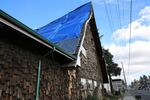
The Human Solutions shelter was evacuated after continued structural and health concerns.
Amelia Templeton / OPB
Multnomah County evacuated its
largest shelter for homeless families late Wednesday, due to safety concerns over damage from a leaking roof.
Some 110 parents and children have moved temporarily into a church across the street. The county was working Thursday to place the families in motels.
Multnomah County Chair Deborah Kafoury apologized for the disruption to families, and promised a deeper look at problems in the county’s shelter system.
“Today, I am ordering a review of our entire family shelter system to ensure that our facilities will not fail those who need our help the most," she said.
The shelter, located at 160th Avenue and Stark Street, is in a shingled building built in 1975 that was previously the Woodshed Restaurant and then the Black Cauldron strip club.
OPB has been preparing to publish a series of stories on health and safety problems at the shelter.
The shelter was the poster child for Portland and Multnomah County's effort to dramatically increase the number of shelter beds available in response to the city’s affordable housing crisis.
The emergency evacuation raises questions about the county’s strategy of quickly opening new shelters in buildings that often were built for very different uses, a strategy that has been a key part of the county’s success in expanding shelter beds and bringing more people inside, at least temporarily.
Related: New Winter Shelter Opens in Downtown Portland
The shelter opened in February 2016. In the two years since, residents, Human Solutions staff and visitors have repeatedly complained to the county about conditions at the shelter.
In addition to the roof leaks, they describe natural gas leaks and a persistent infestation of rats.
When OPB visited the shelter in December, residents described parts of the sheet rock ceiling inside crumbling and falling down that morning.
“I woke my son up and said, 'The sky is falling,' and he didn’t believe me," said a woman who asked OPB not publish her name because she fears her ex-husband.
The woman had been at the shelter with her three sons and their family dog for two months. Shortly after she arrived, multiple gas leaks in the kitchen prompted Human Solutions to shut off the natural gas at the shelter. That left the shelter without hot water for a week or so.
The woman described the conditions as "horrible."
“It was really cold, and there was no hot water. There was no showers, there was no nothing," she said.
Records provided by the county show that Human Solutions reported similar leaks, causing significant portions of the interior drywall and insulation to fall in October 2016 and December 2016 as well.
County records also confirm that gas leaks have been a persistent problem at the shelter since it opened.
Human Solutions paid $950,000 for the building in 2015. The county provided a $300,000 loan and approximately $400,000 grant for renovations.
Now, just two years since the shelter opened, the Joint Office for Homeless Services is looking for a new site that can better serve a larger number of homeless families.
Top of the county’s list: a furniture warehouse at SE 148th Avenue and Stark Street, which the county estimates could serve up to 200 parents and children.
In interviews, Human Solutions Executive Director Andy Miller has defended his organization’s decision to purchase the former strip club building on Stark.
“We felt we found a building that had the right bones to support shelter operations,” he said.
Miller said the organization was aware that the roof was in poor condition and near the end of its lifespan.
“That made the price point in a range that was cost effective and acceptable,” he said. “We were aware that the roof was an issue. We undertook some limited repair to the roof at the time that we purchased it."

Human Solutions recently spent $13,000 on tarping in an effort to deal with roof leaks. Multnomah County has removed all families from the shelter due to safety concerns.
Amelia Templeton / OPB
Miller said he expected the roof would last 5 to 10 years. That time frame was acceptable, because at the end of six years, Human Solutions planned to tear the building down and redevelop the lot as affordable housing.
In addition to the loan from the county, Human Solutions received a community development loan through a nonprofit that helps other agencies develop and finance affordable housing, the Housing Development Center, to help purchase the site.
Holst Architecture and Colas Construction redesigned and renovated of the building into a shelter.
But it’s unclear who came up with the estimate of the roof’s lifespan, or how much due diligence Human Solutions and Multnomah County conducted before purchasing the building.
“The building did not have a formal structural review prior to construction,” Miller wrote in an email.
“The original occupancy rating was such (assembly) that converting it to a shelter did not require a seismic upgrade, which was one of the big reasons the building was selected," Miller added. "The team did walk the building and did not find any issues with it."
As recently as last week, Human Solutions said the building was safe and habitable. Miller and staff said they had responded quickly to leaks, repeatedly hiring contractors to patch the roof.
Most recently, it spent $13,000 to have the entire roof covered in a blue tarp.
Kafoury said she decided to close the shelter after Human Solutions notified the county that pieces of the plaster ceiling had fallen again this week.
"When there is a track record of issues, and it gets to the point that it's not financially feasible to move forward, and the safety of the residents is at stake, that's when you have to make the decision to close down," she said.
The shelter closure and the need to house families in motels will place financial strain on Multnomah County’s already tapped-out resources for homeless families.
Multnomah County added $1.5 million to Human Solutions’ $2 million contract for the family shelter system, after the number of families seeking shelter spiked from approximately 130 nightly to more than 400 nightly last summer.
That $1.5 million came from Multnomah County’s Tax Title fund. It was money the county had initially intended to use to find a more suitable long-term home for the family shelter.
